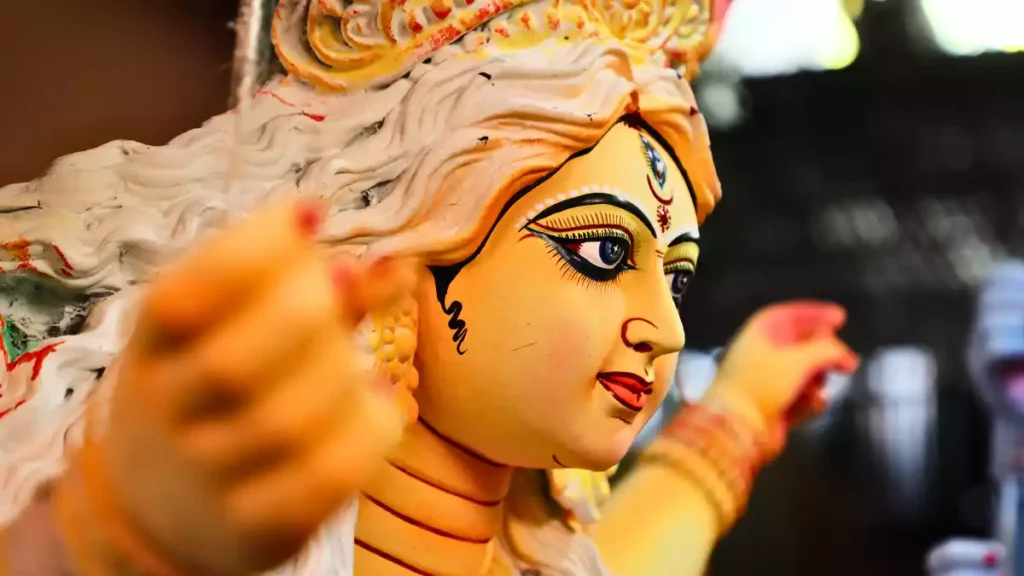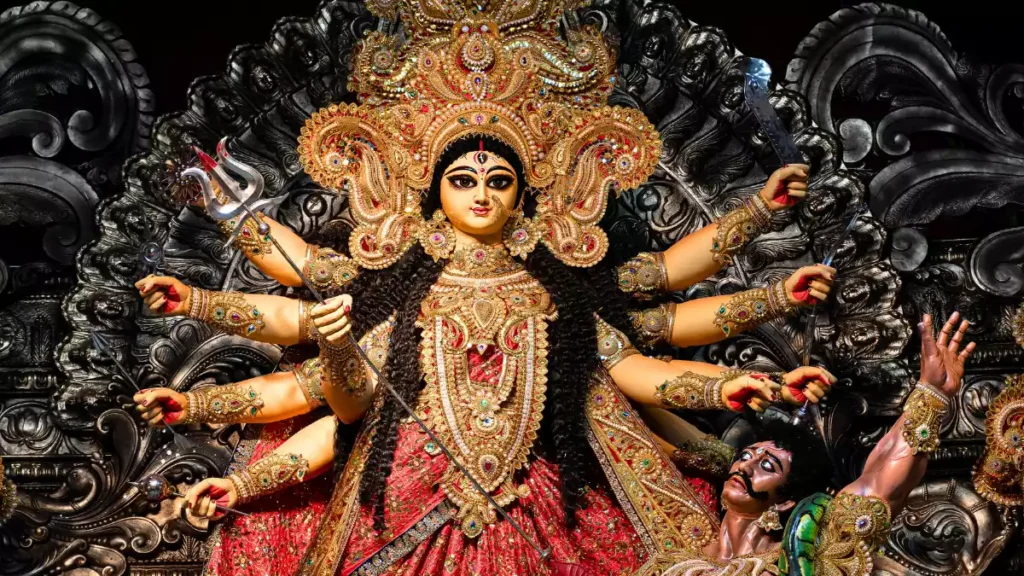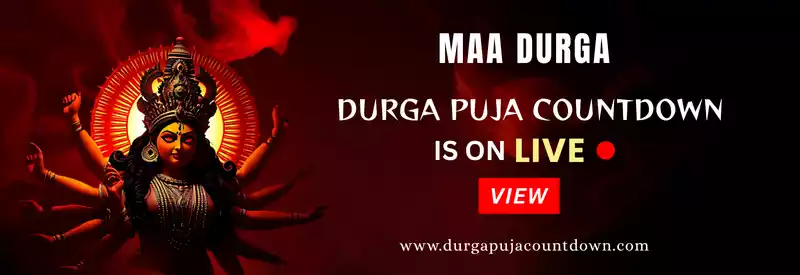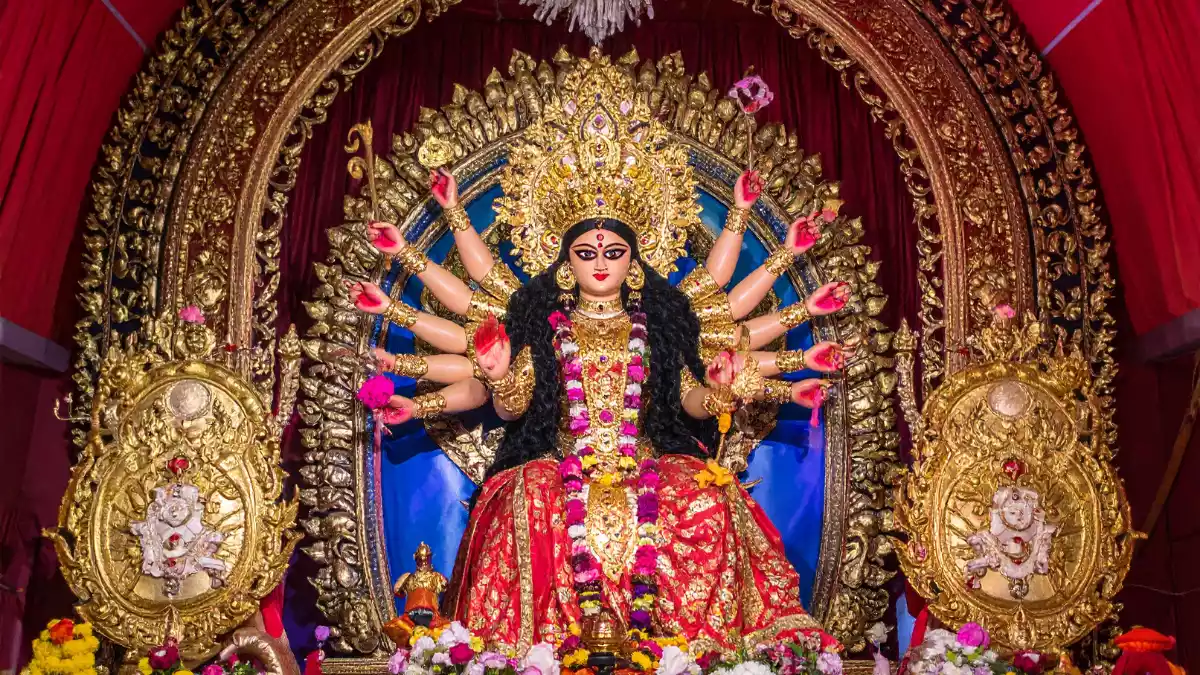Navratri is also known as Shardiya Navratri in the month of October-November. Navratri is the most auspicious Hindu festival with a grand celebration dedicated to Goddess Durga and her nine divine incarnations. Spanning nine nights and ten days, this festival symbolizes the eternal victory of good over evil, light over darkness, and wisdom over ignorance.

In 2025, Shardiya Navratri begins on Monday, September 22, and concludes on Wednesday, October 1, with Vijaya Dashami (Dussehra) being celebrated on Thursday, October 2. This festival is observed with fasting, elaborate pujas, vibrant dances like Garba and Dandiya, and cultural festivities across India.
This comprehensive guide explores the dates, mythological significance, rituals, colors, and regional celebrations of Navratri 2025, helping devotees immerse themselves in the divine spirit of this sacred festival.
The Deep Spiritual Significance of Navratri
Navratri, meaning “Nine Nights” (Nava-Ratri), is deeply connected to cosmic energy, lunar cycles, and the worship of the Divine Feminine (Shakti).
1. The Cosmic and Lunar Connection
- Navratri begins the day after the new moon (Amavasya).
- The first nine days of the lunar cycle are considered feminine, representing Devi (the Goddess).
- The ninth day (Navami) marks the end of this phase, leading to Vijaya Dashami, the day of victory.
- Among the 12 Navratris in a year, Sharada Navratri (October) is the most significant, dedicated to Goddess Sharada (Saraswati), the deity of wisdom.
2. Why is Sharada Navratri the Most Important?
- It falls during Sharad Ritu (autumn), a season of harvest and new beginnings.
- It celebrates knowledge, learning, and spiritual growth, as Goddess Saraswati is worshipped.
- It marks the victory of Goddess Durga over Mahishasura, symbolizing the destruction of evil.
The Nine Divine Forms of Goddess Durga (Navadurga)
Each day of Navratri is dedicated to a different avatar of Goddess Durga, with unique rituals and colors.
| Day | Goddess Form | Significance | Why Worship? |
|---|---|---|---|
| Day 1 (Pratipada) | Shailaputri | Daughter of the Himalayas, representing purity & strength | For courage and new beginnings |
| Day 2 (Dwitiya) | Brahmacharini | The ascetic form, symbolizing devotion & penance | For peace and spiritual growth |
| Day 3 (Tritiya) | Chandraghanta | Wears a crescent moon, destroys evil spirits | For protection from negativity |
| Day 4 (Chaturthi) | Kushmanda | Creator of the universe, radiates cosmic energy | For health and vitality |
| Day 5 (Panchami) | Skandamata | Mother of Lord Kartikeya, symbolizes motherly love | For family harmony |
| Day 6 (Shashti) | Katyayani | Warrior goddess who slays demons | For strength and victory |
| Day 7 (Saptami) | Kalaratri | The fiercest form, destroys ignorance | For fearlessness |
| Day 8 (Ashtami) | Mahagauri | Symbol of purity and serenity | For inner peace |
| Day 9 (Navami) | Siddhidatri | Grants divine powers and boons | For wisdom and success |
| Day 10 (Dashami) | Vijaya Dashami | Celebrates victory of good over evil | For new beginnings |
Rituals and Traditions of Navratri
The Three Phases of Worship
During Navratri, Goddess Durga is worshipped in three powerful forms:
- First 3 Days (Shakti Puja): Worship as Durga, the destroyer of evil.
- Next 3 Days (Lakshmi Puja): Worship as Goddess Lakshmi, bestower of wealth.
- Last 3 Days (Saraswati Puja): Worship as Goddess Saraswati, giver of wisdom.
Shardiya Navratri 2025 Date and Tithi
| Day | Date (2025) | Tithi | Goddess Form |
|---|---|---|---|
| Day 1 | 22nd September | Pratipada | Shailaputri |
| Day 2 | 23rd September | Dwitiya | Brahmacharini |
| Day 2 | 24th September | Tritiya | Chandraghanta Puja |
| Day 3 | 25th September | Tritiya | Vinayaka Chaturthi |
| Day 4 | 26th September | Chaturthi | Kushmanda |
| Day 5 | 27th September | Maha Panchami | Skandamata |
| Day 6 | 28th September | Maha Sashti | Katyayani |
| Day 7 | 29th September | Maha Saptami | Kalaratri |
| Day 8 | 30th September | Maha Ashtami | Mahagauri |
| Day 9 | 1st October | Maha Navami | Siddhidatri |
Daily Puja Rituals

- Ghatasthapana (Kalash Sthapana): Installing a sacred pot with coconut and mango leaves.
- Aarti & Mantras: Chanting Durga Chalisa and Lalita Sahasranama.
- Fasting (Vrat): Many devotees eat sattvik food (no onion, garlic, grains).
Special Navratri Celebrations
- Kanya Puja (Ashtami/Navami): Young girls (Kanyas) are worshipped as forms of Durga.
- Durga Visarjan (Vijaya Dashami): Idols are immersed in water, symbolizing her return to Kailash.
Colours of Navratri 2025
Unlock prosperity and positivity during Shardiya Navratri 2025 by embracing the sacred colors for each day. These hues channel cosmic energy and Goddess Durga’s divine vibrations. Here’s your complete guide:
| DAY | COLOR | SIGNIFICANCE |
|---|---|---|
| Day 1 | Yellow | Brings joy, positivity, and warmth for a cheerful year |
| Day 2 | Green | Symbolizes growth, peace, and new beginnings |
| Day 3 | Grey | Represents balance, humility, and positive transformation |
| Day 4 | Orange | Radiates creativity, energy, and problem-solving calm |
| Day 5 | White | Symbolizes purity, harmony, and mental clarity |
| Day 6 | Red | Signifies passion, courage, and vitality |
| Day 7 | Royal Blue | Stands for elegance, ambition, and success |
| Day 8 | Pink | Embodies love, kindness, and compassion |
| Day 9 | Purple | Attracts peace, prosperity, and noble energy |
| Day 10 | Peacock Green | Represents wisdom, uniqueness, and compassion |
Why Colours Matter in Navratri
Each color aligns with a specific form of Goddess Durga, creating a spiritual connection:
- Energy Amplification: Colors attract cosmic vibrations for blessings.
- Psychological Impact: Hues like yellow boost joy; red ignites courage.
- Tradition: Wearing the day’s color shows devotion to the Goddess’s avatar.
Pro Tip:
“Pair these colors with traditional attire like sarees or kurtas. Add matching accessories (bangles, scarves) to amplify the energy!”

How to Celebrate Shardiya Navratri 2025
Ghatasthapana
Set up a sacred pot (Kalash) and pray to Goddess Durga to begin the festival.
Daily Puja & Aarti
Offer flowers, incense, and chant prayers to worship different forms of Durga each day.
Fasting
Many people fast during Navratri, eating only fruits and special foods made for the occasion.
Garba & Dandiya
Join in the joyful traditional dances, especially popular in Gujarat and Maharashtra.
Kanya Puja or Kumari Puja
On the 8th or 9th day, young girls are honored as symbols of Goddess Durga.
Durga Visarjan or Bijaya Dashami
On the last day (Vijayadashami), Durga idols are placed in water to mark the end of Navratri.
Mythological Stories Behind Navratri
Navratri is rooted in ancient Hindu scriptures and Puranas, with three major legends explaining its significance.
1. Goddess Durga’s Victory Over Mahishasura
- Mahishasura, a powerful demon, unleashed terror on Earth and Heaven.
- The Tridev (Brahma, Vishnu, Shiva) combined their energies to create Goddess Durga, the ultimate warrior.
- After a nine-day battle, she defeated Mahishasura on Vijaya Dashami, establishing dharma.
2. Lord Rama’s Worship Before Defeating Ravana
- Before the epic battle with Ravana, Lord Rama performed Durga Puja to seek blessings.
- He needed 108 lotuses but found only 107. To complete the puja, he was about to offer his eye (Netra) when Goddess Durga appeared and blessed him.
- This is why Dussehra (Vijaya Dashami) also marks Rama’s victory over Ravana.
3. Goddess Uma’s Annual Visit to Her Parents
- Goddess Parvati (Uma), married to Lord Shiva, visits her parents’ home for nine days.
- This symbolizes a daughter’s return to her maternal home, making Navratri a family reunion festival in many regions.
Navratri 2025: Do’s and Don’ts for Devotees
How Navratri is Celebrated Across India
Durga Puja (West Bengal, Odisha, Assam)
- Massive pandals with artistic Durga idols.
- Dhunuchi dance, Sindoor Khela, and cultural performances.
Garba & Dandiya (Gujarat, Maharashtra)
- People dance in circles with Dandiya sticks wearing colorful chaniya cholis.
Ayudha Puja (South India – Karnataka, Tamil Nadu)
- Worshipping tools, books, and vehicles for blessings.
Ramlila & Ravan Dahan (North India – UP, Delhi)
- Dramatic enactments of Ramayana ending with burning Ravana’s effigy.
Embrace the Divine Energy of Navratri 2025
Navratri is not just a festival, it is a spiritual journey that brings prosperity, wisdom, and strength. By following the rituals, wearing the right colors, and immersing in devotion, devotees can invoke the blessings of Goddess Durga for a successful year ahead.

FAQ:
Q: When does Shardiya Navratri 2025 start and end?
Shardiya Navratri in 2025 begins on September 22 (Sunday) and ends on September 30 (Monday) with Navami, followed by Vijayadashami on October 1.
Q: What is the significance of each day during Navratri?
Each of the 9 days is dedicated to a different form of Goddess Durga, starting with Shailaputri and ending with Siddhidatri. Devotees worship these forms for health, strength, wisdom, and blessings.
Q: Is fasting compulsory during Navratri?
Fasting is not compulsory but is commonly observed by devotees as a way to purify the body and mind. Many follow a fruit and satvik food diet for the nine days.
Q: What is Ghatasthapana and why is it important?
Ghatasthapana is the ritual of installing a Kalash (sacred pot) on the first day of Navratri. It marks the beginning of the festival and symbolizes the invocation of Goddess Durga’s energy.
Q: Can we do Navratri puja at home?
Yes, Navratri puja can be performed at home. Many people set up a small altar, light a lamp, offer flowers, chant mantras, and perform daily aarti to honor the goddess.
Q: What foods are allowed during Navratri fasting?
Devotees eat satvik foods like fruits, milk, sabudana, kuttu flour, and avoid onion, garlic, grains, and regular salt. Rock salt (sendha namak) is commonly used instead.
Q: Are Garba and Dandiya performed all over India?
Garba and Dandiya are especially popular in Gujarat and Maharashtra, but these energetic dance forms have now become widespread across India and among Indian communities worldwide during Navratri.
Q: Can men also fast and participate in rituals during Navratri?
Yes, Absolutely. Both men and women observe Navratri rituals and fasting. The festival celebrates divine feminine energy, but participation is open to all devotees.
 Join Now
Join Now


I would like to thank you for the efforts you have put in penning this blog.
I really hope to view the same high-grade content by
you in the future as well. In truth, your creative writing abilities has encouraged me to get my
very own site now 😉
can you please add prasad to be distributed on each day
Hello! I’m at work surfing around your blog from my new iphone 3gs!
Just wanted to say I love reading your blog and look forward to all your posts!
Carry on the outstanding work!